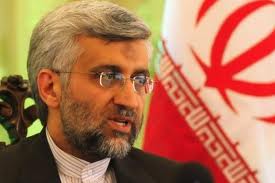 Iran’s senior nuclear negotiator and representatives of international powers emerged Tuesday from two days of talks on Tehran’s nuclear program without having reached an agreement.
Iran’s senior nuclear negotiator and representatives of international powers emerged Tuesday from two days of talks on Tehran’s nuclear program without having reached an agreement.
“We emphasized that uranium enrichment is the inalienable right of the Iranian nation,” Saeed Jalili told reporters after meeting with the five permanent members of the U.N. Security Council and Germany, according to the semi-official FARS News Agency. “Enrichment for peaceful uses in all levels is an inalienable right.”
He added that Tehran has “no problem” with transparency, but does not want to be deprived of technology that it has a right to pursue.
“We are ready for cooperation with the International Atomic Energy Agency,” Jalili said, referring to the United Nations’ nuclear watchdog. But he added that Iran must be allowed the same privileges set out by the nuclear nonproliferation treaty that other countries are allowed.
CNN
The United States and other countries have said they suspect that Iran is seeking to become a nuclear power, which Tehran has said is not true.
A key concern is that the nuclear fuel Iran is making could also be used to make the highly enriched uranium — above 20% — needed for an atom bomb.
But Jalili said that Iran’s leadership has issued a fatwa that prevents the production and use of weapons of mass destruction.
“As we’ve said many times before in this process, there is no reason for a stop to Iran’s peaceful advancement in nuclear technology,” Jalili added.
He cited the country’s production of 20%-enriched fuel as material needed to make medicine for more than 1 million Iranian cancer patients.
According to FARS, Tehran had proposed at a previous meeting in Baghdad that it would stop production, close the Fordow facility where the work is carried out, and ship its purified fuel out of the country.
In return, the countries offered to supply Tehran with fuel for its medical research reactor, which requires 20% uranium, and to ease sanctions.
Jalili was speaking at a news conference after a second day of talks with the G5+1 representatives that included E.U. foreign policy chief Catherine Ashton, who said that proposal was reiterated during the talks.
She described the talks as “detailed, tough and frank exchanges.”
The Iranians “did begin to address the substance for the first time, but there’s a very, very long way to go, and I’m sure that Dr. Jalili would say that, too,” Ashton told reporters.
The parties have agreed to hold a technical-level meeting in Istanbul on July 3, where experts in nuclear technology will hash out details, she said.
“The choice is Iran’s,” she said. “We expect Iran to decide whether it is willing to make diplomacy work, to focus on reaching agreement on concrete, confidence-building steps and to address the concerns of the international community.”
CNN

Leave a Reply
You must be logged in to post a comment.